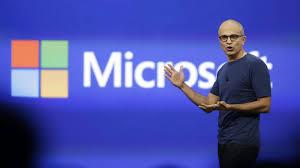I don’t believe I’ve met Satya Nadella, Microsoft’s new CEO. But I do know Bill Gates, Steve Ballmer, and John Thompson (the chairman of the board). I like the new management team.
I’ve been disinterested in anything Microsoft does for almost a decade. Why? My clients—customer-centric, tech-savvy executives in both large and small companies—stopped caring about Microsoft. They used to care a lot. Now, what Microsoft does is largely irrelevant to their business and personal lives. Many of my clients still use PCs. But most have non-Windows phones, and they typically have non-MS tablets. They still use MS Office apps. But they don’t care what Microsoft does.
The “post-PC” strategy that Nadella has telegraphed finally piqued my interest. Of course Microsoft is going to focus on mobile phones and on the Cloud. What else would they do? The big danger I see ahead is for Microsoft to chart a predictable course. If they focus on evangelizing Windows Phones and Microsoft Azure, they’re toast! Nobody will care about Microsoft’s phone OS or about Microsoft Azure, Microsoft’s cloud computing alternative to Amazon AWS, IBM’s cloud, HP’s cloud, or Google Compute cloud.
I don’t believe that enough consumers will adopt Windows Phones to save Microsoft’s bacon. And I don’t believe that enough enterprises will migrate their data centers to Microsoft’s cloud to replenish their profits.
But I do have an idea about what the right strategy is for Microsoft. And it’s too good to keep to myself. So I decided to write an open letter to Satya Nadella.
What’s my plan?
I believe that Microsoft should leverage one of its largest assets: the millions of application developers who use Microsoft’s development tools and frameworks to do their jobs. Nadella should empower these developers to write interoperable mobile apps—not just for Windows Phones, but also for Android and Apple phones and even for feature phones (Nokia’s largest installed base). These apps can be optimized to integrate and synchronize with applications and services hosted in Microsoft’s cloud.
But, to really sing, this strategy needs to go one step further. It’s not enough to support cross-platform mobile development. Microsoft also needs to help its enterprise customers develop secure, distributed “customer clouds.” Today’s consumer and business end-customers want to access and manage all their stuff from multiple devices and from anywhere, and at all times of day and night. To do that efficiently, you need what I call customer clouds. These are secure cloud computing environments that are essentially customer portals—they provide your customers with secure and easy access to everything they need to do in and around your brand.
Where should these customer clouds be hosted? And by whom? That’s the proverbial $64,000 question. Consumers and business customers are becoming paranoid about government spying on their information. For example, Australians may trust their own government. But they don’t trust the U.S. government. If you want to provide Australians with access to their information, you had better host that information in Australia.
But, if every company needs to provide customer clouds in every jurisdiction in which they have customers, that’s a LOT of data centers. Why not let a large, trusted(?) entity like IBM, HP, or Microsoft (or Amazon or Google) invest in that distributed cloud infrastructure? Then you can set up your own federated customer clouds in their secure cloud infrastructure. That’s my vision for what Microsoft could do to win back the hearts and minds of its enterprise customers.
So here’s my open letter to Satya Nadella along with an explanation of my proposed strategy:
Priorities for Microsoft’s New CEO
















